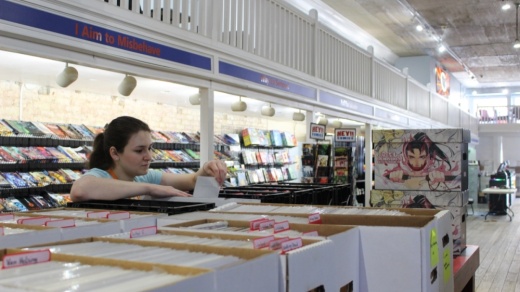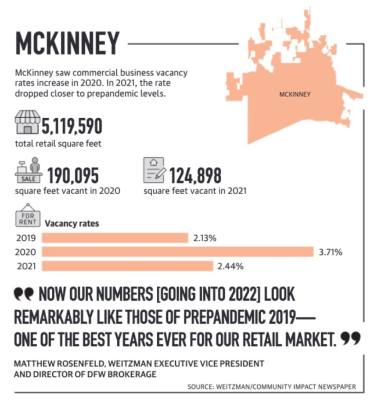The store’s owners said they had a website that listed its location and contact information but no way for customers to purchase items online.
Once the city mandated shutdowns for nonessential businesses, Carpe Diem Comics co-owner Melyssa Childs-Wiley said she spent 12 hours each day entering the store’s inventory onto an e-commerce website powered by Square. Her husband and co-owner, Shado Wiley, went to the store every day to pack and ship orders.
Wiley said web orders paid the store’s rent for the entire month of April 2020.
Two years later, the business is thriving more than ever, the couple said. The initial e-commerce debut allowed Carpe Diem Comics to reach more customers, which led to them moving to a space three times the size of the original store in April 2021.
Not only did the store’s size expand, but so did the staff. For the first year of business, Childs-Wiley and Wiley worked the store by themselves.
In the store’s early days, Wiley unpacked new shipments at the front of the store. Now, he said there are so many customers he has to unpack new inventory out of sight.
That return to in-person shopping is something officials with Texas-based commercial real estate firm Weitzman said is happening throughout the Dallas-Fort Worth metroplex.
“We’re in a much better place today [than March 2020],” Weitzman Executive Vice President Michelle Caplan said during the firm’s annual forecast that was livestreamed in January. “Everyone from retailers to landlords to shoppers ... have all faced enormous challenges with innovation and ingenuity.”
The innovation that Caplan referenced is part of what led to Carpe Diem Comics’ expansion.
“We moved here, and quickly we knew we needed one employee just because the space was so big,” Wiley said. “Then we had to add another employee because there was so much going on.”
As part of its report, Weitzman noted construction of new retail space in the region was at an all-time low in 2021, with just 640,000 square feet of new space added. That was nearly half the previous record low of 1.2 million square feet built in 2012, according to Matthew Rosenfeld, Weitzman executive vice president and director of DFW brokerage. However, increased demand for retail space and rising occupancy rates are expected to help turn things around in 2022, according to the forecast.
“Based on what’s in the pipeline, we expect construction to total approximately 2 million square feet [in 2022],” Caplan said. “That’s more than double the 2021 total, but it remains on the conservative side.”
The Weitzman forecast also found retail occupancy was at 93.5% throughout the region at the end of 2021. That rate was the third highest total the firm has recorded for DFW, just below its previously recorded highs of nearly 94% in 2019 and almost 95% in 1981.
The firm’s data is based on more than 1,400 shopping centers totaling more than 200 million square feet of retail space across DFW. Weitzman’s forecast for this year expects retail occupancy to increase to 95%.
The retail leasing market, which refers to newly available space, was also the third strongest the firm has seen in 22 years, Rosenfeld said.
“This is [a] complete reversal from 2020, when pandemic-related closures resulted in vacancy jumping by more than 4 million square feet,” Rosenfeld said at the January event. “Now our numbers [going into 2022] look remarkably like those of prepandemic 2019—one of the best years ever for our retail market.”
Adapting in McKinney
The adjustments Carpe Diem Comics made are ones that most business owners who are operating today also made, said Cindy Schneible, president of the McKinney Community Development Corp.
“You have a component of your business that is attractive to people who want to be actually in the store and come in and shop, but you also have to make yourself available through other means,” she said.
Schneible added that many businesses had likely planned to have online platforms prepandemic, but COVID-19 “accelerated” the process.
She cited Spoons Cafe in downtown McKinney. Shortly after the pandemic began, the restaurant pivoted in a way beyond to-go and curbside pickup orders. The website now includes “Spoons Fed,” the restaurant’s meal delivery service reminiscent of HelloFresh.
The service includes ready-to-eat, prepackaged meals that can either be delivered or picked up from the restaurant.
McKinney’s alcohol industry received a similar boost thanks to a June 2020 amendment to the city’s code of ordinances. The amendment allowed open alcohol containers in public places in an effort to help businesses affected by the pandemic, officials said.
In addition to businesses, the area has seen a shift in the way apartments and townhomes are designed, said Matt Enzler, a senior managing director with multifamily development company Trammell Crow Residential. The company has built multifamily developments in McKinney and more throughout the metroplex.
“We’re adding more home office-type options,” Enzler said. “Then outside the unit we’ve added ... more workspace. You don’t necessarily want to live and work in the same spot 24 hours a day.”
‘Tech and mortar’
Rosenfeld said grocery stores throughout the region have led the way in using digital tools to help physical retailers meet changing customer needs. Weitzman calls that approach “tech and mortar.”
“Without a doubt, COVID[-19] has transformed grocery shoppers’ behavior, and brick-and-mortar locations [that] are offering delivery and curbside pickup [are] benefiting,” Rosenfeld said.
The region is seeing expansions from grocers, such as Kroger and H-E-B, according to the Weitzman forecast. H-E-B has announced plans to open new stores in McKinney in 2023 and in Plano and Frisco in 2022.
The demand for Walmart’s pickup and delivery services has led the company to increase its order fulfillment capacity by 40% over the last two years, according to Lauren Willis, the retailer’s communications director for Texas.
To help meet customers’ new shopping patterns, Walmart is adding market fulfillment centers to many existing stores, including ones in Plano and Lewisville. These centers will help meet the demand for Walmart’s contactless pickup and delivery services in those cities and throughout the metroplex.
“Think of [these centers] as a condensed, modular warehouse in a number of Walmart stores across the country,” Willis said. “These local fulfillment centers are built within or added to a store to hold thousands of items customers shop [for] the most—from pantry, frozen and chilled foods to consumables and electronics—all in one flexible space.”
Looking ahead
While some effects of the pandemic may not be long term, others have yet to see an end. Childs-Wiley said because the early days of the pandemic found people in their homes for extended periods of time, the demand for collectible items, such as Pokemon cards, skyrocketed.
“You had all this stuff that people were buying before and now they’re not buying [those things], and all this stuff that they were buying before but [the amount has] suddenly exploded,” Wiley said. “I don’t even know how to order right now.”
What is likely to remain is the need for businesses to operate both in person and online, Schneible said.
“When things started to open up again, the thing that we observed was how much people look forward to actually being in a place,” she said. “You can’t replace that, but you can, when times call for it, adapt to do your business in a different way.”
Editor's note: The original post has been edited to correct an error. The correct spelling for Weitzman executive president and director of DFW brokerage is Matthew Rosenfeld.







